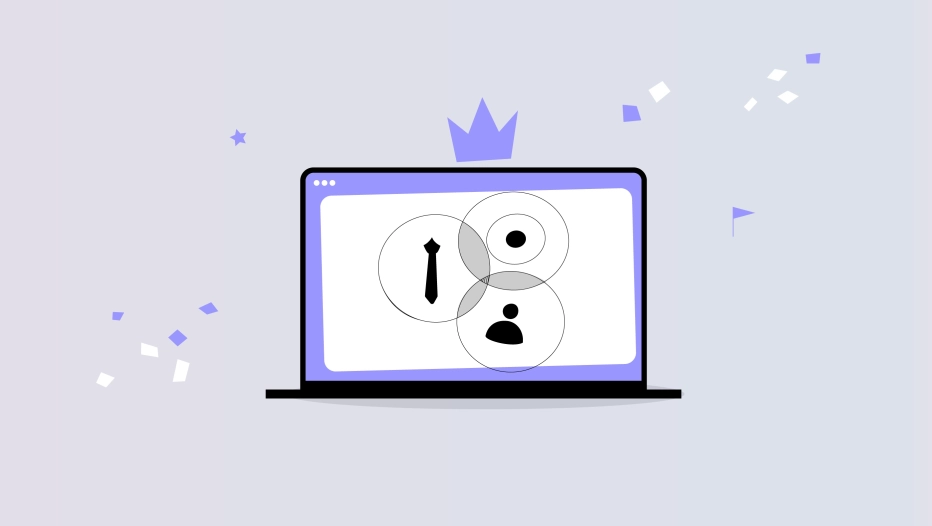Are you familiar with the term “quiet quitting”?
Simply put, it’s when an employee does just the bare minimum in order to keep their job. It’s a phenomenon that has been identified fairly recently and which has been gathering momentum.
According to Gallup, quiet quitters make up around 50% of the workforce in the US, maybe even more. That is a massive problem that nobody seems to want to deal with.
We are not going to get into the reasons why that is, but we will agree that it’s the perfect manifestation of workers being disengaged in the workplace. More importantly, we will focus on the different ways in which you can keep your employees inspired.
Check out our list of 9 strategies and tips you can start implementing right now to improve employee engagement.
What is employee engagement?
Employee engagement is a measure in which your team members are invested in the work at your agency, business, or organization. The engagement also extends to the commitment your employees to the company, as well as the attachment to their colleagues.
Now, even though employee engagement gets thrown around a lot these days, it’s much more than a buzzword. In fact, it’s one of the most important factors that play a role in your company’s productivity and success.
And it’s also a two-way street that demonstrates company culture and how organizations support their employees. We also need to point out that employee engagement is something that varies over time, which is why employers also need to be engaged and in touch with their employees’ needs.
Why employee engagement matters

The most obvious reason is that it affects your business’s bottom line. According to the research, not engaged or actively disengaged employees account for $1.9 trillion in lost profits alone.
And since disengaged employees are more likely to quit or get laid off, there is the hidden cost of recruiting, onboarding, and training new employees. However, when it comes to employee engagement, things go deeper than money.
Here is how having engaged team members can affect your agency in a positive way:
- Higher employee retention: engaged team members are inspired by their work and the impact they are making, which makes them more satisfied and less likely to jump ship.
- Improved productivity: According to statistics, companies with high employee engagement are 18% more productive and 23% more profitable than competing companies with low employee engagement.
- Boosts team morale: When team members are engaged, they are happy to come in and work with one another, which creates a better work atmosphere.
- Results in better ideas and solutions: Highly engaged employees are more likely to give their best effort, which results in ideas and creativity that disengaged employees wouldn’t usually tap into.
- Positive impact on agency growth and bottom line: As we pointed out previously, engaged team members make your team more productive, and higher output equals more revenue.
- Better communication and collaboration: Engaged employees not only believe in your agency’s mission, but they also trust your leadership and each other, which is the foundation of good collaboration. And good team collaboration is a direct result of good communication and using the right team collaboration software and tool.
- Increased customer satisfaction: Higher engagement is directly connected to a higher quality of work your customers receive. So, as you can see, everybody wins here.
9 ways to boost employee engagement in your agency
Because employee engagement is a two-way street, here are the things you need to do on your end to foster an environment in which your team members can thrive:
Improve your onboarding process
Engaging your team members is not a one-time thing or a quick fix, but rather an ongoing process, and it starts the moment an employee officially becomes a part of your agency team or company. This is where proper onboarding plays a key role.
If possible, make sure to give your new employee to settle in and adapt. Quite often, companies just swamp the newcomer with a mountain of information they need to process and expect them to hit the ground running.
Improve your onboarding process by providing sufficient training not just when it comes to your company’s policies, but also your mission and day-to-day activities. And that also applies to the social aspect of work as well, so don’t forget to make new team members feel like they belong.
The easier way to do this is to pair them up with someone who’s been longer at the company, so they can show them around.
Connect your team members’ work to what matters to them

Let’s assume that your team members like what they do. And one of the reasons they like it is because they can see how their work fits the bigger picture. In other words, your employees need to know how their work contributes to the overall goals and success of your business.
How do you do this? Well, one of the ways would be to give your employees objectives. For example, if you are managing a content writing and SEO agency, you may want to produce 250 high-quality SEO articles by the end of Q4.
Then, your content and SEO team reverse engineers their targets from there by subdividing their work into monthly, weekly, and daily targets. Or you can set an internal goal: improving your agency’s domain authority (DA) or ranking for certain keywords.
Be open to cross-departmental training and transfers
The majority of teams, along with its members, don’t exist in a vacuum, which means their a certain degree of collaboration among different departments and other teams. If that’s not the case, that’s yet another opportunity for you to boost employee engagement.
We are talking about cross-department training and opportunities, as well as transfers to cross-functional teams, whether permanent or temporary. Here is why this matters:
- Employees who are engaged are always looking to expand their skills and knowledge.
- They will have a better understanding of how different teams approach their work.
- It creates a more cohesive bond and created active lines of communication.
Provide opportunities for career advancement
In addition to providing your team members with opportunities to expand their skills, you should also enable them to climb the ladder within your company. Sure, some employees may be satisfied with learning new things, but others will want to transform that knowledge to further their careers.
Plus, think about how engaged they would be in case they were passed over for a promotion or if they knew in advance that their current position is as far as they will go in your company.
Be open about what they need to do in order to get a promotion, because that also benefits your company. You know that it is always a lot cheaper to find the right person for a specific position within your own team than to look for new people.
Enable both direct and anonymous feedback
This one is pretty underrated as far as ways of engaging your employees go. If you are able to mentor and provide direct feedback on their work, that can have a massive impact on how engaged they are in the workplace.
With that being said, here is what need to do as a manager to engage your employees and build a better relationship with them:
- Regular one-on-one meetings: Checking in with your team members on a regular can help you gather valuable information about how they feel about their daily tasks, workload, as well as the projects they are working on, as well as build a more human relationship with your employees.
- Individual approach: Some team members may respond better to criticism while others thrive on compliments. It’s up to you to figure out what drives them and keeps them feeling valued and respected.
- Active listening: When having a direct conversation with one of your employees, make an effort to really hear them out and understand what they have to say. If they feels as if they are being heard, their engagement level will increase.
- Mutual feedback: We’ve covered how you can give feedback, but receiving can serve as a valuable source of info not just about a specific employee, but the overall culture in your organization. If you feel like asking for direct feedback would make your team members uncomfortable, you can always allow for anonymous feedback.
Organize team building activities
Team building activities are an important piece of the puzzle that is employee engagement. When your employees get together outside of work, it enables them to develop trust and respect for each other, as well as friendship, which then translates into stronger working relationships.
There is a huge range of activities you can organize, from simple lunches or drinks after work, to team workshops and spending time in nature. However, you need to keep two things in mind you want team building to improve employee engagement.
First, you need to make sure these activities are completely voluntary. Otherwise, they will have the opposite effect. Employees who are forced to do something they don’t want will definitely be on the lookout for a more flexible company.
Second, run a poll to see what sort of activities your team members would be interested in before spending your money.
Acknowledge and reward your employees
Acknowledging all the hard work an employee has done is one of the biggest generators of engagement. Obviously, there is a personal satisfaction your team members feel when they do a good job, but not everyone is self-motivated like that.
Make sure to commend an employee who has picked up extra work in order to cover for a team member who is on sick leave, or acknowledge that a project was completed successfully because someone gave 110%.
Apart from public acknowledgement, you should also make it a point to reward your employees, whether through bonuses, raises, or promotions, as well as by offering additional days off or gift certificates.
Make work less stressful
There are so many things that stress your employees at work that it deserves a whole different article. At this time, we will focus on the stress that comes as a result of not providing your team members with adequate to do their job.
For example, if they have to switch among several extensive Excel sheets in order to find the information they need, or to fill out information about their tasks, statuses, or hours manually, it just generates more busy work and additional stress, because there is plenty of room for error.
The solution would be to get a productivity platform like ActiveCollab. With ActiveCollab, you can manage your entire team and all the work that they do. From time tracking to resource management, ActiveCollab can do a lot of the heavy lifting, so your employee can focus on being engaged and focused on their core activities.
Keep egos in check
This means both your own, as well as those of your employees. It’s fairly natural for people to want to have their way and for work to be done a certain way, but it’s also something that opens up the door for conflict and poor interactions.
Tactics like micromanagement can also poison the well, and when you add all of that up, employee engagement is nowhere to be found. Instead, you and your employees should always focus on the bigger picture.
And if you have done all of the things listed in previous points, and acknowledged the contributions of your employees, then ego will become a non-issue.
Real-life examples of employee engagement
Now, all this talk about employee engagement and how it manifests itself in the workplace does seem a bit abstract, which is why we have selected a few real-life companies that are the champions of employee engagement:
Patagonia: in-house child care
Patagonia is best known for its outdoor apparel, especially those fleece vests that finance and tech bros love to wear, but it’s also become the talk of the industry thanks to its positive work culture and different ways in which engages its workers.
For instance, they offer in-house childcare solutions for parents, as well as other family-friendly policies. This enables their employees to worry less about stuff outside of work, so they can get more done while at the office. It’s a win-win situation.
Buffer: team building events for remote teams
Buffer, which is known for its social media management software, organizes team retreats on a regular basis, so that its international and remote teams can bond with each other, collaborate, and exchange their cultures and experiences.
Each retreat is held in a different location, and involves co-working and team building, and they have grown to include entire families.
The cheesecake factory: prioritizing employee recognition and training
The Cheesecake Factory is probably the only restaurant in the world that puts that much stake in employee engagement. And they do so by providing training opportunities, as well as something that they call Wow Stories.
It’s basically a public recognition of an outstanding service done by an employee that gets shared across the entire organization, which does wonders for employee satisfaction and team morale.
Google: 20% time initiative for personal projects
Google 20% time initiative enables its employees to spend 20% of their workweek working on personal projects that don’t have anything to do with their actual work.
By giving their workers this sort of autonomy, Google keeps them engaged, because it gives them an environment where they can experiment and try out different things without fear of failure. Plus, some of their services, such as AdSense and Google News, are the result of such side projects.
Netflix: unlimited vacation policy
Sound too good to be true, huh? Well, it’s not. It’s very much a real policy that Netflix offers its employees. The idea is to engage employees by enabling them to get as much time off as they want, as long as they turn in their work on time.
In other words, employees are valued by how much productive work they do, not how much time they spend inside an office.
Conclusion – Utilize the power of ActiveCollab to engage your agency team
It’s pretty much a given that you can’t implement all the team engagement strategies we have laid out in this article. The good news is that you don’t have to, especially those your agency can’t afford. Not every company has the budget of a small country like Google and Netflix do.
But, you can start with some things that are affordable or free. Such as taking the time to hear your employees out, helping them see the reasons behind all of their hard work, and giving them the right tools for the job.
ActiveCollab is your secret weapon for keeping employee engagement at an all-time high. Thanks to its time tracking and reporting features, you can get a comprehensive view of your team’s engagement and identify all the problem areas and ways you can improve them.
Are you serious about keeping your team members engaged, inspired, and happy? If the answer is yes, then give ActiveCollab a shot!
Sign up for our 14-day free trial, or book a demo, and our experts will explain all the different ways in which ActiveCollab can help turn your agency team into a more engaged, cohesive unit capable of tapping into its full potential!


